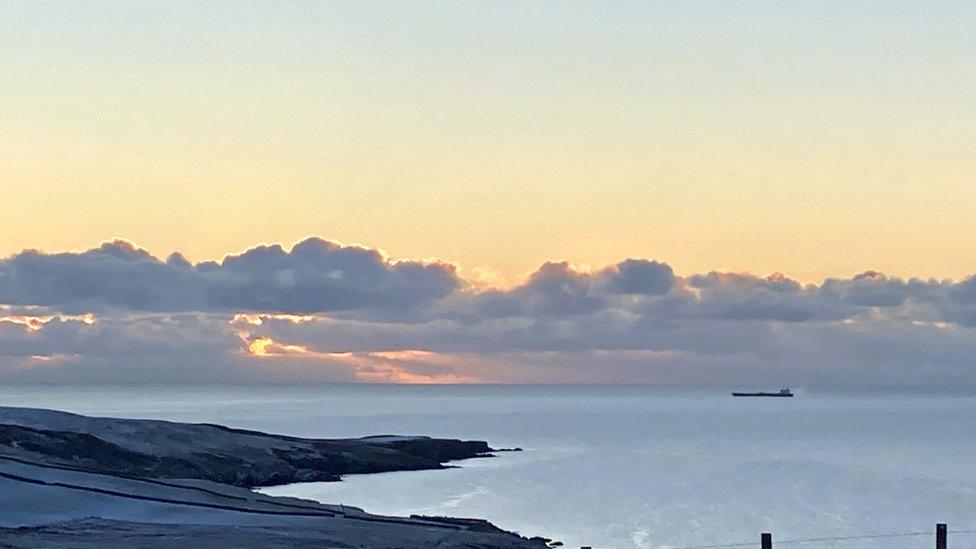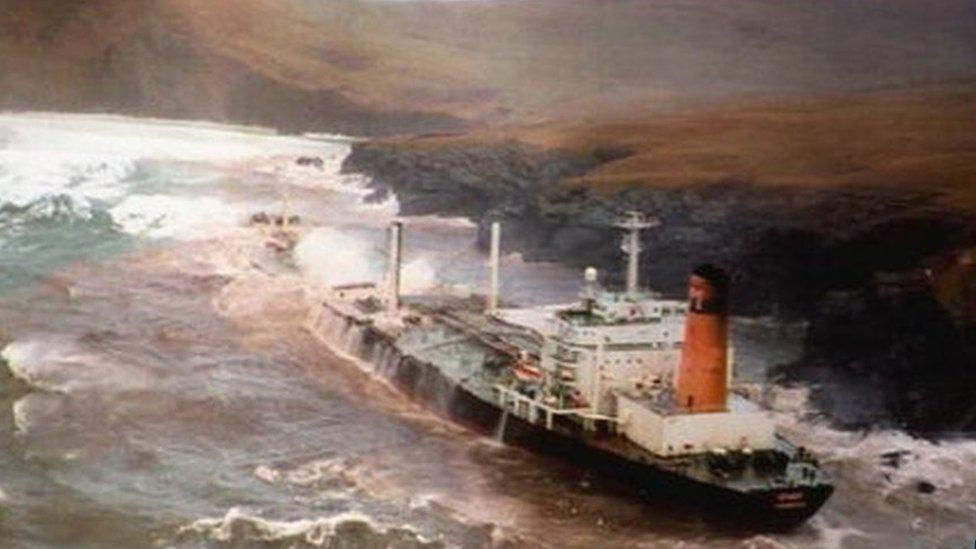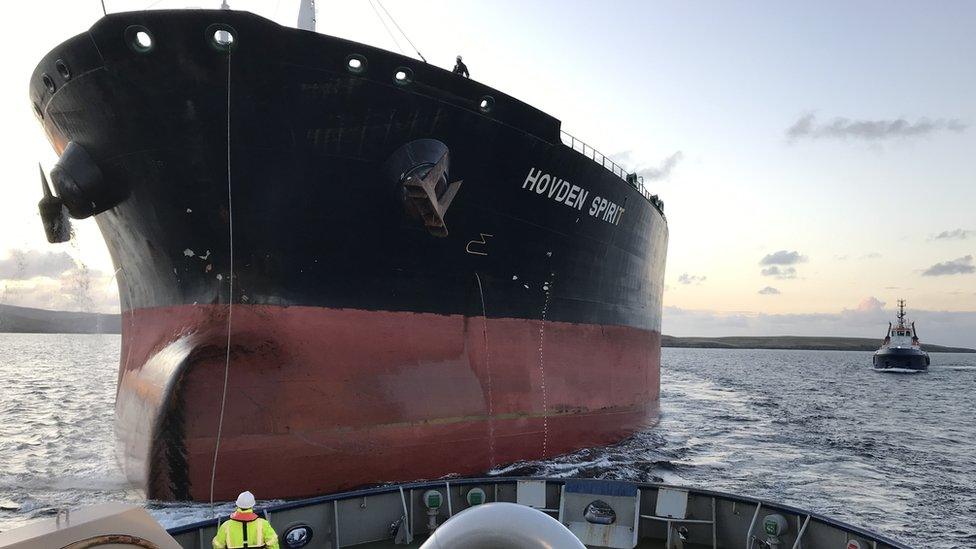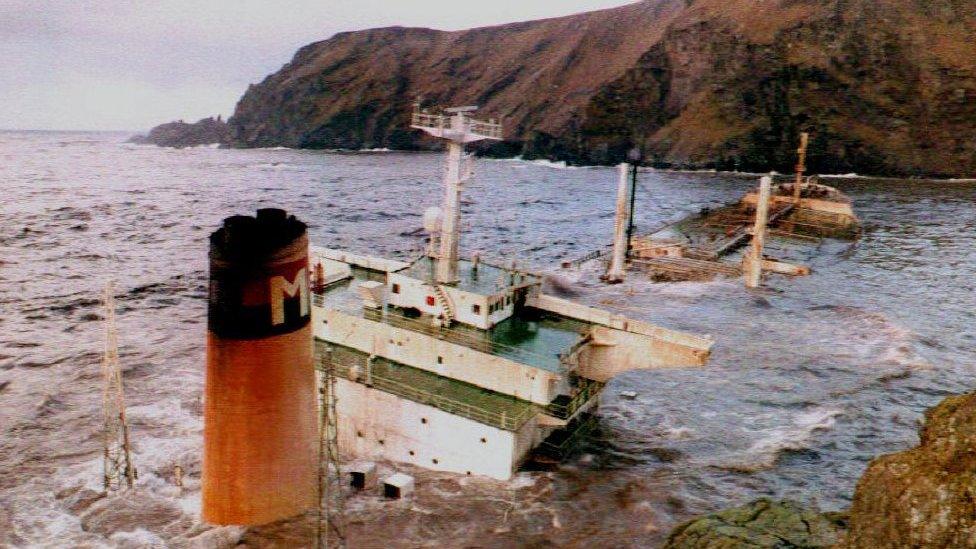Concern over Shetland 'parking lot' for floating oil storage
- Published

Hovden Spirit can be seen sitting off Shetland
Concern has been expressed about the potential risk posed by tankers using Shetland's coastline as a "parking lot" for floating oil storage.
The Hovden Spirit - carrying hundreds of thousands of barrels of Brent crude - is the latest vessel to hug the coast while awaiting a destination.
The tankers are not breaking any national or international rules.
However, Shetland's former marine operations director said they should not be spending weeks so close to land.
Captain George Sutherland described it as a "parking lot for floating storage" for tankers waiting for the oil market to change.
Braer: The huge oil spill that Shetland survived
"With low oil prices, tankers are coming to anchor laden with cargo," he said.
"They're anchoring on a fairly exposed coastline, near areas of environmental sensitivity, and there are people very concerned about that."
He said tankers can take shelter during poor weather, but they should not remain for extended periods.

The Braer disaster took place off the coast of mainland Shetland in 1993
Mr Sutherland was instrumental in drawing up Shetland's strict environmental protections in the 1980s.
In January 1993, the Braer oil tanker was caught in hurricane-force winds, spilling more than 80,000 tonnes of crude oil. It hit rocks just west of Sumburgh Head.
The captain and crew were airlifted to safety by helicopter after the engines failed and it became clear disaster was imminent.
The weather limited the extent of the damage by sweeping much of the oil out to sea, but hundreds of birds died.
Shetland's environmental rules were further strengthened after the Braer disaster.
'Complex area'
Mr Sutherland said: "Voyage instructions for tankers approaching and leaving Sullom [Voe] contained the instruction to remain clear of the coast of Shetland for up to 20 miles.
"I'm sure that's still the case right now."
However, for more than a year tankers have not been complying with this.
Shetland Islands Council said: "This is a complex area involving maritime law and historical agreements. It will take some time to explore the possible options available."
The council, which is responsible for the coastline and ports, had previously said the instruction was "under review" and not enforceable.

The Maritime and Coastguard Agency (MCA) said it was "not involved in the conditions of a purported local agreement or contract" and did not have the powers to enforce any such rule.
The MCA stressed that the Hovden Spirit was not breaking any national or international rules by lying off the coast fully laden, and said it was monitoring the vessel's progress.
This stance has provoked an angry response among some Shetlanders.
Former councillor Dr Jonathan Wills - a reporter during Shetland's oil boom - wrote a book detailing the historic agreements, and insists a 20-mile rule should apply.
'Kept us safe'
"Why are they suddenly talking about reviewing this agreement which has lasted for three decades?" he said.
"It's unwise and it ought to be stopped and we ought to go back to the system we had for decades, which kept us safe after the Braer."
Councillors have received calls and emails from constituents about the tankers sitting on the horizon.
Stephen Leask, who represents Lerwick North and is a member of the Harbour Board, said: "People are seriously concerned about the environmental impact it could have.
"We obviously want to extend the life of Sullom Voe and we don't want to impact on that, by keeping it an open port and accessible as it can be.
"But the first concern is the safety for the environment of Shetland. Second is the economic impact."
Hovden Spirit owner, Teekay, said the vessel was using a designated safe anchorage south of Lerwick, with full permission from port control and the Coastguard.
Teekay also said that access to a mobile phone signal was not a factor.
- Published5 January 2018
